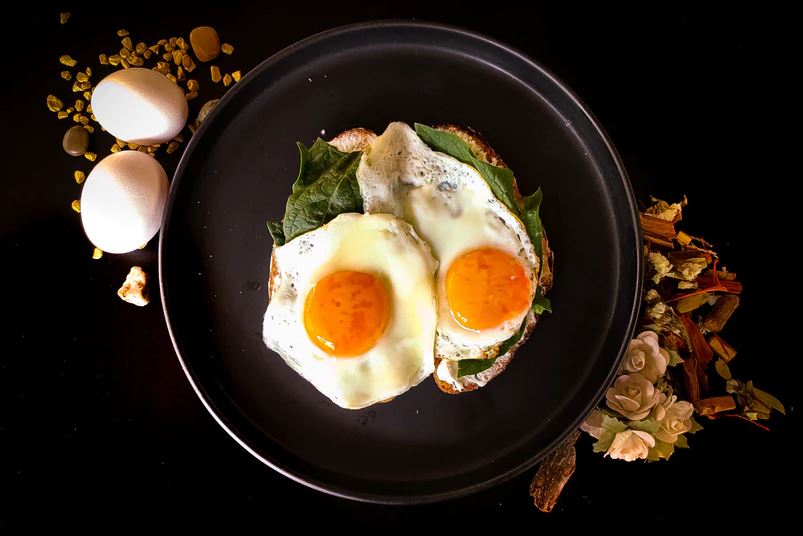Focusing on lean muscle development is important for many people. There are several exercises and lifestyle habits that you can adopt if you’re looking to increase your lean muscle mass. In addition to physical activity, however, it’s also important to focus on your nutrition to achieve this fitness goal.
When you’re striving to work out and get the body of your dreams, you have to put it through a lot of physical challenges. It makes sense that your body would need the proper form of nutritional support. If you’re not up to speed on lean muscle food, here are some great options to start with:
1. Eggs
Eggs are a source of several essential nutrients that we need to fuel our bodies. There’s some quality protein in there, as well as healthy fats. Plus, you get some choline and B vitamins to boot.
Since this breakfast food has a lot of leucine as well, it’s also great for gaining muscle. Leucine is an amino acid that makes up the proteins in eggs.
The B vitamins are especially important here, as they support several of our body’s processes. This includes the production of energy. Hence, by consuming more eggs, we also get the energy we need for our regular workouts. Try them with home-grown tomatoes for even more nutrients on a daily basis.
Pros
- Eggs are one item that may provide you with the energy you need to go through the day.
- Eating eggs on a daily basis may significantly improve the health of your eyes and hair.
- Eggs are a type of food that may be consumed to help prevent sickness.
- Eggs are recommended for pregnant women because they contain folate. Because folate is necessary for the growth of the baby, eggs are an excellent source of folate when pregnant.
- Not only can eggs provide your body with the nutritional requirements, but they can also help you lose weight.
Cons
- Uncooked eggs provide a significant risk of salmonella contamination.
- Eggs are recognized for being abundant in nutrients, but they are also high in salt.
- Although eggs have not been shown to significantly boost cholesterol levels, you should exercise caution when consuming high-cholesterol items.
2. Tofu
View this post on Instagram
If you’re a vegan or a vegetarian who prefers not to consume eggs, that doesn’t mean that you can’t build up lean muscle. We can use tofu, which is made from soy milk, as a meat substitute in several dishes.
Just half a cup of raw tofu gives us six grams of healthy fat, 10 grams of protein, and just two grams of carbohydrates. This food also provides a lot of calcium, making it excellent for promoting bone health and muscle function.
Soybeans and tofu contain soy protein, which ranks among the highest quality of plant proteins. Keep this in mind, and you wouldn’t feel deprived by having to let go of the chicken and fish options further down this list.
3. Salmon
View this post on Instagram
A nice piece of salmon can make for a lovely dinner or lunch, but it’s especially useful if you’re focusing on building lean muscles and maintaining your overall health at the same time. Just three ounces of salmon has 17 grams of protein, around two grams of Omega-3 fatty acids, and many essential B vitamins as well.
The Omega-2 fatty acids are not just great for the immune system, but they also promote general muscular health and could even spur on muscle growth while you’re going through your exercise programs. Tuna is another fish that gives you decent levels of Omega-3 fatty acids, so try that one as well.
Pros
- Salmon is 30% slimmer than farmed salmon and has 20% more protein.
- Toxin levels in salmon are much lower.
- The journal Science issued a warning in January 2004 that farmed salmon has ten times more contaminants (dioxin, PCBs, etc.) than wild salmon.
- The research suggested eating farmed salmon just once per month or two.
- Salmon has no harmful effects on the environment.
Cons
- Wild salmon is significantly more costly.
4. Chicken Breasts
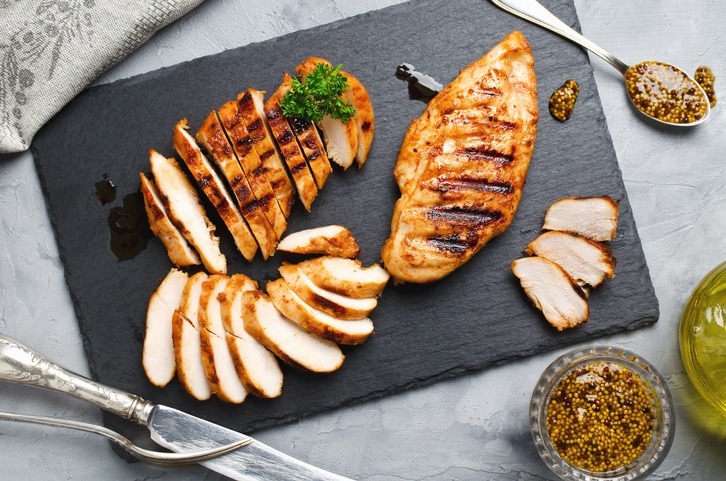
Chicken in general is a great source of protein, but it seems like chicken breasts are a must for gaining lean muscle. They have a lot of protein per ounce, with three ounces having around 26 grams of quality protein. Having your own hens will ensure that you’re eating clean and healthy chicken. There might be some problems in the henhouse, thorough, so make sure that you’re up to tackling those.
Chicken breasts also contain a decent amount of niacin and B6, both of which are important B vitamins for active people. With these, our body is more likely to function as needed for our exercises.
Some Benefits
- Muscles and bones that are stronger
- Weight Control and Heart Health
- Sufficient Dopamine/Better Mood Booster
Some Risks
- Contamination with E. coli
- Cholesterol level
- Resistance to antibiotics
- Cancer danger
- Arsenic poisoning
5. Lean Beef
View this post on Instagram
Eating red meat might raise a few eyebrows, but research shows that lean beef can lead to an increase in the lean mass muscle we gain during weight training.
Beef in itself is a rich source of B vitamins, protein, creatine, and minerals. If we do go for this option, it’s a good idea to stick to the lean kind. This will give us the necessary support for muscle gain but will limit calories at the same time.
6. Cottage Cheese
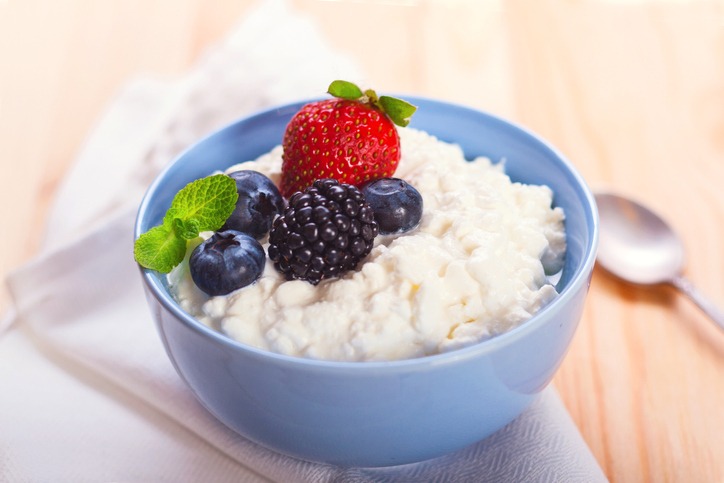
Low-fat cottage cheese is fairly easy to make at home and an excellent way to get lots of protein. One cup gives us 28 grams of protein as well as a nice amount of leucine.
This kind of cheese also comes in full-fat versions, so opt for that if you’re trying to get in more calories. You can use this cheese as a snack, part of a salad, or mix it in with a cooked meal for some added flavor and benefits.
Pros
- Cottage cheese is affordable and widely available. At the grocery store, a huge tub is generally only a few bucks.
- The cottage cheese diet is simple. There are no difficult recipes or shopping lists to contend about.
- Cottage cheese has a lot of protein. One cup of low-fat cottage cheese has 28 grams of protein and just 163 calories.
Cons
- If you simply eat cottage cheese all day, you may become bored and give up on the diet. This may result in binge eating and, as a result, sabotage of your weight reduction efforts.
- Food cravings may be triggered by dietary constraints.
- There is no fiber in cottage cheese. Fiber is recommended daily intake (RDI) for women aged 19 to 50 and 38 g for males aged 19 to 50. People over the age of 50 require slightly less.
7. Beans
View this post on Instagram
There are several kinds of beans available in the market today. Making these part of your diet while working towards lean muscle gain will ensure that your options are never boring. You have black beans, kidney beans, and pinto beans as your best option, each of which contains 15 grams of protein in one cup (cooked).
Beans are delicious additions to any diet, but their high iron, magnesium, and phosphorus content makes them even better for someone wanting to develop lean muscle. Look up some ways to cook dried beans for a more versatile and interesting daily menu.
8. Chickpeas
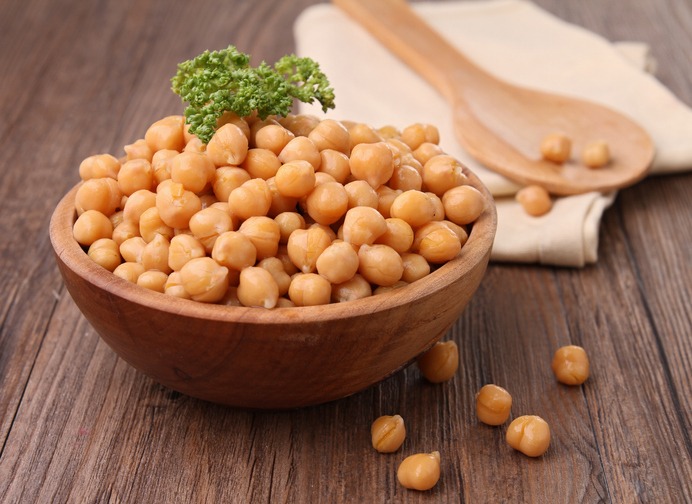
Another great vegan or vegetarian option for getting protein and carb is chickpeas. These are also called garbanzo beans and are a nice source of fiber as well.
A cup of canned garbanzo beans gives you about 50 grams of carbohydrates and 12 grams of healthy protein. While the quality of this protein is lower than that derived from animal sources, chickpeas can still be consumed for a muscle-building diet. Even if you eat meat, having chickpeas every few days can make a nice change in your menu.
Pros
- Chickpeas are a low-calorie weight-loss food.
- They are excellent fillers.
- Dishes made out of it are good for the blood.
- They contain a lot of iron and calcium.
- The grains are considered high in folic acid.
- Chickpeas help to build muscle.
- They are good for your nerves and muscles.
Cons
- Raw ripe chickpeas contain toxic chemicals that can prevent important nutrients from being absorbed.
- It’s a bean paradox. Even though they are high in nutrients, they also contain anti-nutrients.
9. Peanuts
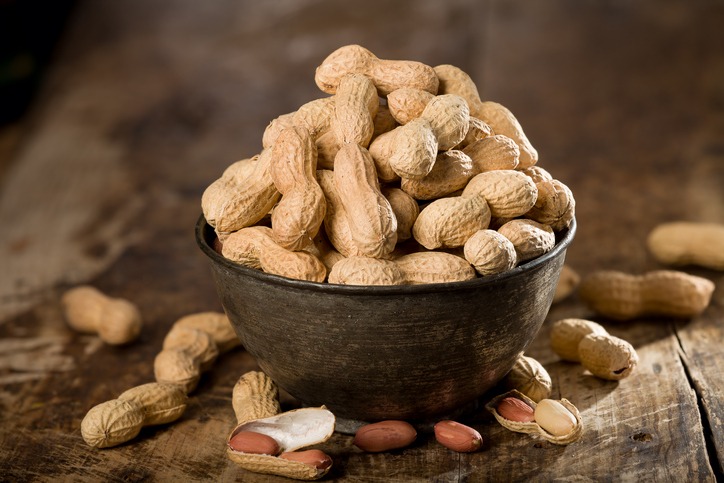
Roasted and salted peanuts in a packet may not be the best option for any diet. If you can get your hands on a more natural and raw option, however, protein gets you a nice mixture of healthy carbs, fat, and protein. Stick to a moderate amount, say a half cup every other day, and you’ll be able to benefit from the nutrients in peanuts while building lean muscle.
If you’re looking for a plant-based source of leucine, peanuts contain higher levels of this than most plant products. They’re also very high in calories, with half a cup containing about 425. Getting enough calories for driving muscle gain might become challenging, so try snacking on peanuts for some extra healthy calories and important nutrients.
Pros
- Protein and fiber are abundant.
- Antioxidants are abundant.
- Suppressant of Appetite
- Peanuts Can Be Eaten in a Variety of Ways
- Reduces the risk of stroke
Cons
- Encourages High Blood Pressure
- Helps with Weight Gain
- If you overeat, you may decrease your appetite for other meals like fruits and vegetables.
- Additives are present.
10. Milk
View this post on Instagram
Milk has long been presumed to be an essential part of a healthy diet. As long as you’re not lactose intolerant, adding milk to your diet can help in building lean muscle. This is because milk has a combination of healthy fats, carbs, and even protein.
Other dairy items like Greek yogurt are also good, but milk has both slow and fast-digesting protein. This quality is beneficial if we want to achieve muscle growth. Many studies show how we can increase muscle mass production by drinking milk along with weight training.
Pros
- It Could Aid in Blood Sugar Balance
- It promotes bone health.
- It’s High in Nutrients
Cons
- It Could Hurt Our Bones
- It is related to many diseases
- Some people are allergic to it or are intolerant of it.
Conclusion
Your diet plan is probably just as important as your exercise plan, so don’t skimp on this aspect of lean muscle development. You’d need a lot of protein to get that lean muscle, but the energy needed will come from some well-chosen healthy fats and complex carbohydrates. Stick with this motto, and you’d hopefully be able to determine what’s best for your goals and what isn’t.
If you’re looking for ideas on how to develop lean muscle, it pays to start eating right as soon as possible. When we put the best fuel into our bodies, we’re much more likely to get the best possible results.


